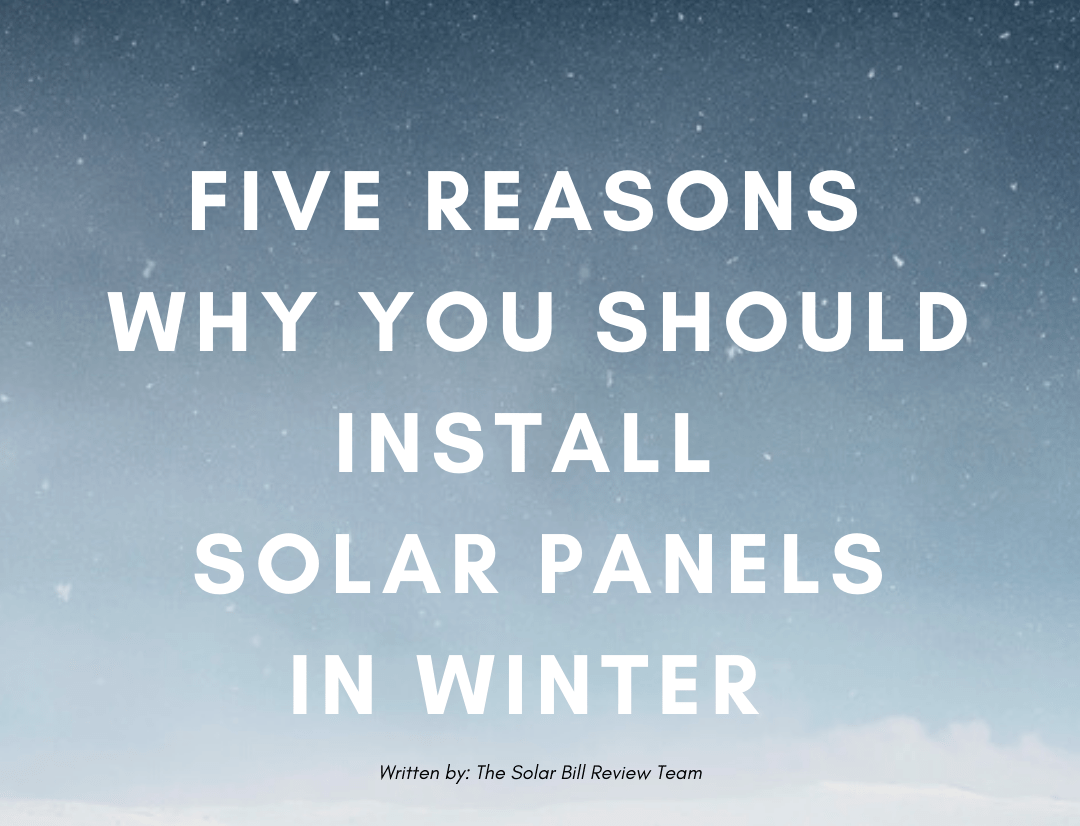Five Reasons Why You Should Install Solar Panels In Winter
While summer is the most popular time to install solar panels, winter is actually the ideal time. And here are the reasons why you should install solar panels in winter :
1. You will have your system ready for the summer season (a.k.a. the Peak Production Season)
On average, it takes 2-3 months from signing of the contract to get your solar up and running. If you wait until the summer to install your solar panels, you will miss an entire year of saving energy. If you start now, your panels will be ready by mid-Spring and most importantly, by peak production season.
Furthermore, you should keep in mind that installing solar panels is an investment to reduce the overall energy consumption throughout the year. Hence, there is no better time to start than now. The longer you wait to be installed, the longer you will be paying the full electric bill to your local energy company.
2. Your solar system will still produce in colder months
One of the most common misconceptions is that solar panels do not work in winter. This is not true because: the sun rises every day no matter how cold it is. Solar energy is created in sunlight, and not heat, making it a reliable and resilient source of energy throughout the year. The amount of electricity solar panels can generate will depend on the density of cloud cover. Usually, solar panels can produce electricity in cloudy weather, which is around 10%-25% of what they can produce on a sunny day.
During the coldest months, we are oftentimes paying higher electricity bills because we are spending more time indoors with our heaters on and need light for the most part of the day. On top of this, the restrictions brought by the pandemic makes it almost impossible for us to leave the house. This is why getting your solar panels installed in winter to start saving money is important. Even if it is raining or snowing in your area, as long as there is sunlight, your solar panels will work.
But what about snow?
Dustings of snow in your panels will not cause significant disruptions as the sun’s UV rays can still penetrate through a small amount of snow.[1] You also have to know that solar panels are typically installed at a tilted angle up to 30 to 45 degrees, which will allow most snow to slide off and prevent accumulation. Since solar panels are generally installed facing south or southwest, the snow easily melts or slides off the moment the sun comes up. However, in cases of significant accumulation, manual removal or hiring professional cleaning services may be the best option.
SunPower solar systems are also designed for maximum efficiency, which means they can produce electricity even in low-light conditions.[2] SunPower technology uses high-quality, anti-reflective glass that traps the light from all angles, capturing more sunlight than what conventional panels can do.
Finally, it is important to point out that if solar panels can work very well in states like Massachusetts, New Jersey, and even Alaska, California can surely pull off a few months of winter!
3. Installers are less busy, and incentives are plenty!
There are a few important items that installers need to take care of before the installation can begin. From site survey to finalizing the homeowner’s design to securing permitting permits to ensuring that they have all the materials needed for the project, it can get very busy especially in summer. This is why some installers offer season deals during the off-season to attract more customers. With fewer homeowners shopping for solar, you can be assured that you will get different quotes from different installers. From an economic standpoint, you will probably be able to snatch good deals with a trusted solar company since the demand for installation is lower in winter. Besides, the slow season gives you the benefit of finding an installer who can be hands on to your project.
Here’s a pro-tip: Do not wait until the last minute of solar incentives. More and more people get their solar installed, which means that California’s tax credits and incentives may not be as generous as they are now.
4. Solar Installers Appreciate Installing in Winter
While lots of sunshine is good for production, it can be tough for installers to install in the middle of summer. Winter installation means that solar crews do not need to get on a scorching roof at 100°F+, which is brutal. As long as there is no snow or ice, it is easier for crews to stay up on a roof.
5. Solar Panel Efficiency Increase in Cold Weather
Think of your solar panels like any of your electronic devices (e.g. computers, radios, or household appliances)- they function better in cold weather temperatures in comparison to hotter temperatures. Research says that panels begin losing efficiency around 77F[3]. Moreover, solar panels produce electricity more efficiently in cold temperatures, which in turn, increases the daily amount of electricity produced despite shorter daylight. In summary, as long as there is sunlight and clear skies, your solar panels will be efficient in winter.
The Solar Bill Review Guarantee: The Solar Bill Review will take care of you from signing to install, and even provide post-installation services. With us, you will have peace of mind from start to finish. We are also only working with SunPower, a company that uses modern technology and combines excellent aesthetics with the best efficiency. With the SunPower and Solar Bill Review Team’s 25 years of service warranty, you will be assured that no harsh weather can stop you from making the most out of your solar panels. Receive a free quote today.
[1] https://www.renewableenergymagazine.com/emily-folk/effectiveness-of-solar-panels-during-the-winter-20201223
[2] https://us.sunpower.com/blog/2016/12/06/yes-solar-panels-work-winter
[3] https://www.cedgreentech.com/article/how-does-heat-affect-solar-panel-efficiencies
